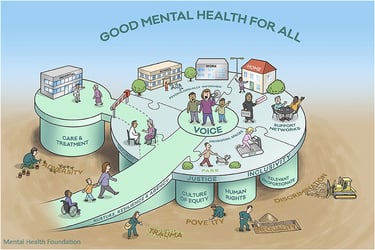I was a key player in the development of Thrive LDN. I led the horizon scanning and identified methods to do needs assessment before the start of the initiative. Initially commissioned by the Mayor of London’s team to map inequalities and determinants of poor mental health across London boroughs (a piece of work I published in the Lancet Psychiatry), I then went on to oversee coordinated community conversations across several London boroughs. I heard directly from citizens and local employees and stakeholders on what were their priorities for improving mental health and reducing health inequalities locally. This work, which was done in partnership with the Greater London Authority (GLA), Local Authorities, public health teams and local employers, has been published in a series of reports by the GLA ("Londoners Said" and "Londoners Did") and has directly informed health investments by the GLA and the Thrive LDN programme.
Some examples of the impact of my work

Working with the International Initiative of Mental Health Leadership (IIMHL) I have developed and designed an influential Socio-Ecological Model for Urban Public Mental Health which is about improving health through influencing the circumstances in which citizens are born, live, work and age, and places the voice of people at the core. This model has been widely used by health leaders and I have used it to develop guidelines for urban mental health initiatives for international city leaders.


In 2019 I led the largest ever campaign in the UK on Body Image as part of Mental Health Awareness Week. I managed teams that produce content for the public, practitioners and policy makers. I convened stakeholders to look into the emerging area of body editing apps, which led to Google Store updating its guidelines for app developers to factor in risks to mental health. I also co-led a significant campaign policy success in relation to regulations making it illegal to carry out injectable toxin and dermal filler procedures on under 18s in England for cosmetic purposes. Recognising my role in producing the policy change, I was asked by the Department of Health and Social Care to introduce the new laws in the launch video.

I have led highly influential work on public health data.
For example, following when the UK government trialled in 2013 to place restrictions in the scope of Electronic Health Record (EHR) data collection on the ability to conduct research, I led demonstrator reviews revealing, for the first time, the emerging trend of how real world evidence influences clinical guidelines, and the impact that the new regulations would have. As a result, the care.data programme was scaled back, and later a £1.7m partnership programme on building on the influence of real world evidence on guidelines was established.
When the new General Data Protection Regulation (GDPR) was introduced in 2016, I co-led an influencing campaign to the EU Parliament to ensure the regulation was appropriately informed when it came to public health data research - all our asks were satisfied.
I have also worked in a key development role with the Medicines and Healthcare products Regulatory Agency (MHRA) to develop its new capability on post-marketing real world data pragmatic trials for drug and vaccine safety, which have led to applications used, among others examples, during the COVID-19 pandemic for new vaccine and treatment surveillance.
